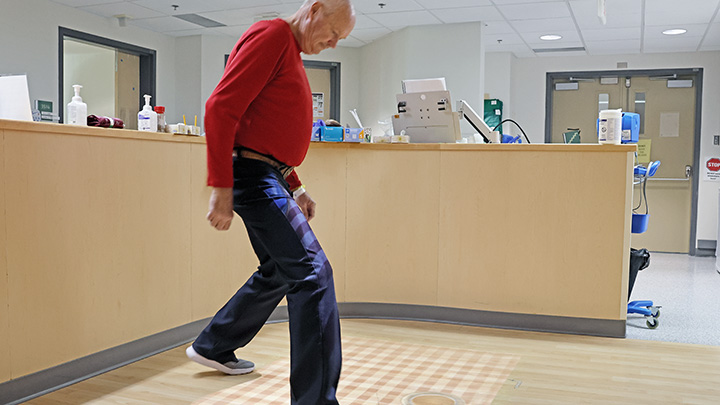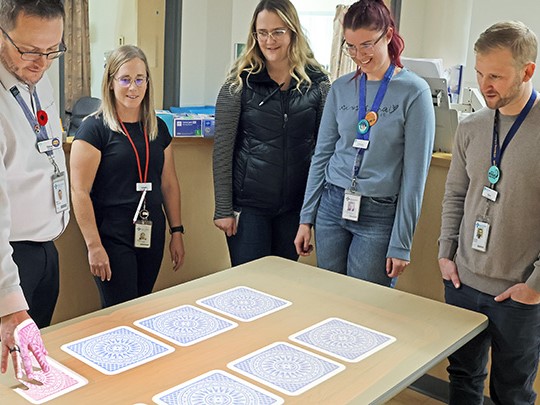From left: Tetz, Letasha Reid. Kaylin Berlinguette, Candice Morse and Michael Dew.
Photo by Jonathan Koch.
Innisfail-area resident, Grant Gordon had a long road to recovery after being admitted to the Red Deer Regional Health Centre for a brain injury.
When Gordon arrived at the hospital's Rehabilitation Unit 35, he initially dreaded the weeks of rehab to come.
“I didn't want to talk to anybody. I didn't want to see anyone,” he said.
A month later, he returned home with a transformed perspective partly due to a magic table called a Tovertafel.
The system combines a projector, infrared sensors, and specialized software that transforms floors and tables into an interactive play area.
Gordon used the system to help regain his mobility. Playing interactive games that respond to the movement of his hands and legs, he was able to improve his vision and cognition while practising his balance in a unique and fun way.
“You get a few people watching and kind of laughing or cheering or jeering and it makes it even more fun,” Gordon said.

Photo by Jonathan Koch.
Mike Dew, acute care manager of the Neurology and Medicine Unit 33 explained that the Tovertafel was introduced to improve the rehabilitation journey of stroke and neurological patients.
Dew is hopeful that the installation of the magic table in neighbouring units is the first step in creating a shared integrated neurology service between the two departments.
“The gold standard in Canada for stroke-specific care is an integrated stroke unit where you have acute care and intensive rehab in the same place,” said Dew. “The Tovertafel is our first step to being able to work even more tightly with each other and really make sure that the doors between Units 33 and 35 are open as much as they can be.”
As both departments continue exploring opportunities to integrate their stroke services, Steve Tetz Unit 35 manager, said his staff are becoming more aware of what goes on in Unit 33.
“Better awareness means better referrals, better referrals mean better flow, and having the Tovertafel allows us to do cutting-edge therapeutic activities that lead to quicker patient rehabilitation,” said Tetz.
The Tovertafel was purchased with funding from the Red Deer Regional Health Foundation.
The magic table has been in operation in Unit 35 for a few months and has been a popular addition for patients, families, and staff.
"Patients will often ask, ‘Can you turn the Tover on so that we can play it?’," said Letasha Reid, recreation therapist. “They enjoy being able to use it with other people and playing different tabletop games with family and friends."
**With information provided by Alberta Health Services
Sign up to get the latest local news headlines delivered directly to your inbox every afternoon.
Send your news tips, story ideas, pictures, and videos to news@centralalbertaonline.com.
CentralAlbertaOnline encourages you to get your news directly from your trusted source by bookmarking this page and downloading the CentralAlbertaOnline app.
